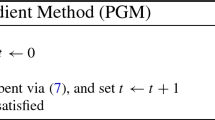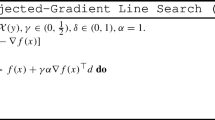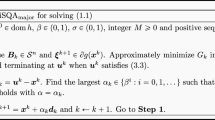Abstract
In this paper, we propose a novel algorithm that is based on quadratic-piecewise-linear approximations of DC functions to solve nonnegative sparsity-constrained optimization. A penalized DC (difference of two convex functions) formulation is proved to be equivalent to the original problem under a suitable penalty parameter. We employ quadratic-piecewise-linear approximations to the two parts of the DC objective function, resulting in a nonconvex subproblem. This is the key ingredient of our main algorithm. This nonconvex subproblem can be solved by a globally convergent alternating variable algorithm. Under some mild conditions, we prove that the proposed main algorithm for the penalized problem is globally convergent. Some preliminary numerical results on the sparse nonnegative least squares and logistic regression problems demonstrate the efficiency of our algorithm.


Similar content being viewed by others
References
Ahn, M., Pang, J.S., Xin, J.: Difference-of-convex learning: directional stationarity, optimality, and sparsity. SIAM J. Optim. 27(3), 1637–1665 (2017)
Bagirov, A.M., Karmitsa, N., Mäkelä, M.M.: Introduction to Nonsmooth Optimization: Theory, Practice, and Software. Springer, Berlin (2014)
Bardsley, J., Nagy, J.: Covariance-preconditioned iterative methods for nonnegatively constrained astronomical imaging. SIAM J. Matrix Anal. Appl. 27(4), 1184–1197 (2006)
Barzilai, J., Borwein, J.M.: Two-point step size gradient methods. IMA J. Numer. Anal. 8(1), 141–148 (1988)
Bennett, K.P., Mangasarian, O.L.: Bilinear separation of two sets in \(n\)-space. Comput. Optim. Appl. 2, 207–227 (1993)
Bertsimas, D., King, A., Mazumder, R.: Best subset selection via a modern optimization lens. Ann. Stat. 44(2), 818–852 (2016)
Bradley, P.S., Mangasarian, O.L., Street, W.N.: Clustering via concave minimization. In: Proceedings of the 9th International Conference on Neural Information Processing Systems, pp. 368–374 (1996)
Candès, E.J., Romberg, J., Tao, T.: Robust uncertainty principles: exact signal reconstruction from highly incomplete frequency information. IEEE Trans. Inf. Theory 52(2), 489–509 (2006)
Dolan, E.D., Moré, J.: Benchmarking optimization software with performance profiles. Math. Program. 91, 201–213 (2002)
Ferrera, J.: An Introduction to Nonsmooth Analysis. Academic Press, New York (2014)
Gaudioso, M., Giallombardo, G., Miglionico, G.: Minimizing piecewise-concave functions over polyhedra. Math. Oper. Res. 43(2), 347–692 (2018)
Gaudioso, M., Giallombardo, G., Miglionico, G., et al.: Minimizing nonsmooth DC functions via successive DC piecewise-affine approximations. J. Glob. Optim. 71(1), 37–55 (2018)
Gaudioso, M., Gorgone, E., Hiriart-Urruty, J.-B.: Feature selection in SVM via polyhedral k-norm. Optim. Lett. 14(1), 19–36 (2020)
Gotoh, J., Takeda, A., Tono, K.: DC formulations and algorithms for sparse optimization problems. Math. Program. 169(1), 141–176 (2018)
Gulpinar, N., Le Thi, H.A., Moeini, M.: Robust investment strategies with discrete assets choice constraints using DC programming. Optimization 59(1), 45–62 (2010)
Gao, Y., Sun, D.F.: A majorized penalty approach for calibrating rank constrained correlation matrix problems. Technical report, National University of Singapore, Singapore (2010)
Itoh, Y., Duarte, M.F., Parente, M.: Perfect recovery conditions for nonnegative sparse modeling. IEEE Trans. Signal Process. 65(1), 69–80 (2017)
Le Thi, H.A., Dinh, T.P.: The DC (difference of convex functions) programming and DCA revisited with DC models of real world nonconvex optimization problems. J. Glob. Optim. 133(1), 23–46 (2005)
Le Thi, H.A., Dinh, T.P., Le, H.M., Vo, X.T.: DC approximation approaches for sparse optimization. Eur. J. Oper. Res. 244(1), 26–46 (2015)
Liu, T., Pong, T.K., Takeda, A.: A successive difference-of-convex approximation method for a class of nonconvex nonsmooth optimization problem. Math. Program. 176, 339–367 (2018)
Lu, Z.S., Zhou, Z.R.: Nonmonotone enhanced proximal DC algorithms for a class of structured nonsmooth DC programming. SIAM J. Optim. 29, 2725–2752 (2019)
Lu, Z.S., Zhou, Z.R., Sun, Z.: Enhanced proximal DC algorithms with extrapolation for a class of structured nonsmooth DC minimization. Math. Program. 176, 369–401 (2019)
Natarajan, B.: Sparse approximate solutions to linear systems. SIAM J. Comput. 24(2), 227–234 (1995)
Nesterov, Y.: Introductory Lectures on Convex Optimization: A Basic Course. Springer, New York (2004)
Pant, J.K., Lu, W.S., Antoniou, A.: New improved algorithms for compressive sensing based on \(l_p\) norm. IEEE Trans. Circuits Syst. Express Briefs 61(3), 198–202 (2014)
Pham Dinh, T., Le Thi, H.A.: Recent advances in DC programming and DCA. Trans. Comput. Intell. 8342, 1–37 (2014)
Plumbley, M.D.: Algorithms for nonnegative independent component analysis. IEEE Trans. Neural Netw. 14(3), 534–43 (2003)
Slawski, M., Hein, M.: Sparse recovery for protein mass spectrometry data. In: Practical Applications of Sparse Modeling, vol. 5, pp. 79-98. MIT Press, Cambridge (2010)
Slawski, M., Hein, M.: Non-negative least squares for high dimensional linear models: consistency and sparse recovery without regularization. Electron. J. Stat. 7, 3004–3056 (2013)
Sun, Y., Chen, H., Tao, J.: Sparse signal recovery via minimax-concave penalty and \(l_1\)-norm loss function. IET Signal Proc. 12(9), 1091–1098 (2018)
Sun, Y.L., Tao, J.X.: Image reconstruction from few views by \(l_0\)-norm optimization. Chin. Phys. B 23(7), (2014)
Sun, Y., Tao, J.: Few views image reconstruction using alternating direction method via \(l_0\)-norm minimization. Int. J. Imaging Syst. Technol. 24(3), 215–223 (2014)
Takeda, A., Niranjan, M., Gotoh, J., Kawahara, Y.: Simultaneous pursuit of out-of-sample performance and sparsity in index tracking portfolios. CMS 10(1), 21–49 (2013)
Thiao, M., Dinh, T.P., Le Thi, H.A.: A DC programming approach for sparse eigenvalue problem. In: Proceedings of the 27th International Conference on Machine Learning, pp. 1063–1070 (2010)
Tono, K., Takeda, A., Gotoh, J.: Efficient DC algorithms for sparse optimization. arXiv: 1701.08498 (2017)
Watson, G.A.: Linear best approximation using a class of polyhedral norms. Numer. Algorithms 2(3), 321–335 (1992)
Wen, B., Chen, X., Pong, T.K.: A proximal difference-of-convex algorithm with extrapolation. Comput. Optim. Appl. 69(2), 297–324 (2018)
Wen, F., Pei, L., Yang, Y., et al.: Efficient and robust recovery of sparse signal and image using generalized nonconvex regularizations. IEEE Trans. Comput. Imaging 3(4), 566–579 (2017)
Wu, L., Yang, Y., Liu, H.: Nonnegative-lasso and application in index tracking. Comput. Stat. Data Anal. 70, 116–126 (2014)
Xu, Z., Chang, X., Xu, F., et al.: \(l_{\frac{1}{2}}\) regularization: a thresholding representation theory and a fast solver. IEEE Trans. Neural Netw. Learn. Syst. 23(7), 1013–1027 (2012)
Yin, P., Xin, J.: Iterative \(l_1\) minimization for non-convex compressed sensing. J. Comput. Math. 35(4), 437–449 (2017)
Acknowledgements
We are very grateful to Dr. Tuell Green and Sharla Green for their editorial suggestions to improve the written quality of the paper. We also would like to thank Editor and the two anonymous referees for their helpful comments.
Author information
Authors and Affiliations
Corresponding author
Additional information
Publisher's Note
Springer Nature remains neutral with regard to jurisdictional claims in published maps and institutional affiliations.
Rights and permissions
About this article
Cite this article
Shen, C., Liu, X. Solving nonnegative sparsity-constrained optimization via DC quadratic-piecewise-linear approximations. J Glob Optim 81, 1019–1055 (2021). https://doi.org/10.1007/s10898-021-01028-9
Received:
Accepted:
Published:
Issue Date:
DOI: https://doi.org/10.1007/s10898-021-01028-9
Keywords
- Nonnegative sparsity-constrained optimization
- Penalized DC formulation
- Piecewise-linear approximations
- Global convergence




